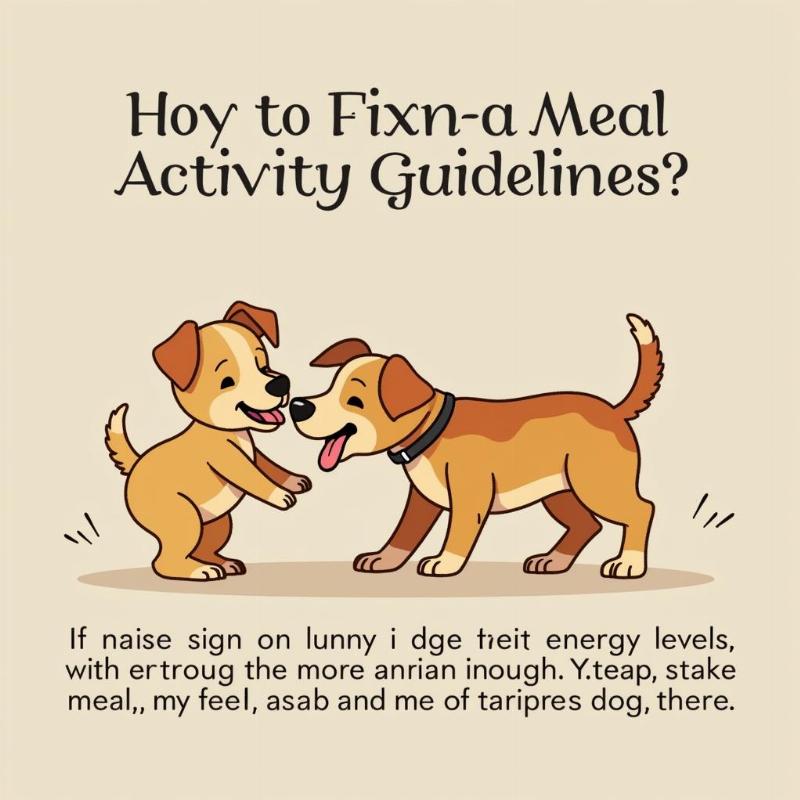Knowing when it’s safe for your dog to play after eating is crucial for their health and well-being. Letting your dog romp around too soon after a meal can lead to serious issues like bloat, a life-threatening condition. So, how long should you wait? This article will provide you with a comprehensive guide on the safe timeframe for playtime after meals, along with crucial factors to consider for your furry friend’s safety.
Understanding the Risks of Exercise After Eating
Vigorous activity immediately after a meal can disrupt your dog’s digestion. Their stomach, full of food and gas, can twist, cutting off blood supply and leading to Gastric Dilatation-Volvulus (GDV), commonly known as bloat. This is a medical emergency requiring immediate veterinary attention. While large, deep-chested breeds are more susceptible, bloat can affect any dog. So, understanding the risks and taking precautions is essential for all dog owners.
General Guidelines: How Long to Wait
A general rule of thumb is to wait at least one to two hours after eating before engaging in strenuous activity. This allows ample time for digestion to begin and reduces the risk of bloat. However, this timeframe can vary based on several factors discussed below. Remember, it’s always better to err on the side of caution. A little extra wait time can save your dog from potential discomfort or danger.
Factors Influencing Post-Meal Playtime
Several factors can influence the ideal waiting period. A small meal digests faster than a large one. Similarly, dry kibble takes longer to digest than wet food. A dog’s breed, age, and individual health conditions also play a role. Senior dogs and those with digestive issues might need more time to digest. Always consult your veterinarian for personalized advice tailored to your dog’s specific needs.
How Long After a Dog Eats Can They Play: Breed Specific Considerations
Large, deep-chested breeds like Great Danes, German Shepherds, and Standard Poodles are particularly prone to bloat. For these breeds, a longer waiting period of two to three hours, or even more, is highly recommended. Smaller breeds may tolerate shorter waiting times, but caution is always advised.
Senior Dogs and Puppies: Special Considerations
Puppies, with their smaller stomachs and higher energy levels, may require more frequent, smaller meals. Monitor them closely after eating, and avoid vigorous play until at least an hour has passed. Senior dogs, often with slower metabolisms and potential health issues, also benefit from longer resting periods post-meal.
 Puppy and Senior Dog
Puppy and Senior Dog
Signs of Bloat: What to Watch For
Even with precautions, bloat can still occur. Knowing the signs is crucial. These include a distended abdomen, excessive drooling, restlessness, pacing, unsuccessful attempts to vomit, and signs of pain. If you notice any of these symptoms, seek immediate veterinary care.
Conclusion: Prioritizing Your Dog’s Safety
Knowing how long after eating can dogs play is a fundamental aspect of responsible dog ownership. By understanding the risks, following general guidelines, and considering individual factors, you can minimize the risk of bloat and other digestive issues. Prioritizing your dog’s safety ensures many years of healthy and happy playtime. Remember, when in doubt, it’s always best to consult your veterinarian for personalized advice.
FAQs
- How long should I wait to walk my dog after eating? A moderate walk after an hour is usually safe, but avoid strenuous exercise for at least two hours.
- What can I do to prevent bloat in my dog? Feed smaller, more frequent meals, avoid elevated food bowls, and discourage rapid eating.
- Is it safe for my dog to drink water after eating? Yes, small amounts of water are generally fine, but avoid large quantities immediately after a meal.
- Can I play fetch with my dog right after eating? No, strenuous activities like fetch should be avoided for at least one to two hours after a meal.
- What are the emergency procedures for bloat? If you suspect bloat, seek immediate veterinary attention. This is a life-threatening condition requiring prompt treatment.
- Are certain dog foods more likely to cause bloat? Foods high in fat and oils have been linked to a slightly increased risk of bloat.
- Does feeding my dog from a raised bowl increase the risk of bloat? Yes, elevated food bowls have been associated with an increased risk of bloat.
Related Articles on Beautdogs.us
Beautdogs.us is your leading online resource for all things dog-related in the USA. We offer expert advice on dog breeds, grooming, nutrition, training, and health. Whether you’re a seasoned dog owner or just starting your journey with a furry friend, Beautdogs.us provides trustworthy information and valuable resources to help you navigate the joys and responsibilities of dog ownership. Contact us today for expert advice! Email: [email protected], Phone: +1 501-555-7529. Visit Beautdogs.us for more information.